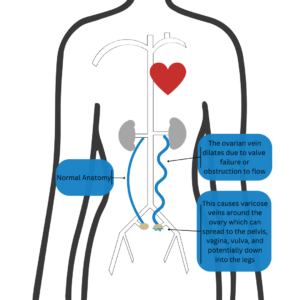Gonadal Vein Reflux / Pelvic Venous Congestion Syndrome (PVCS)

Pelvic Venous Congestion Syndrome (PVCS), also known as Gonadal Vein Reflux, is due to the incompetency of the internal iliac vein, the ovarian vein, or both, similar to varicose veins in the legs. PVCS is often associated with chronic dull, aching pain in the pelvis.
 Gonadal Vein Reflux is caused when abnormal varicose veins develop within the pelvis. It occurs when the valves within the ovarian vein is unable to pump the blood upwards, back toward the heart. Due to gravity, the vein blood reverses direction (reflux) and travels back down the vein towards the pelvis and ovaries where it leads to pooling of deoxygenated blood. The result is the build up of increased pressure within the pelvic veins. This pressure causes the veins to enlarge and pelvic varicose veins begin to form.
Gonadal Vein Reflux is caused when abnormal varicose veins develop within the pelvis. It occurs when the valves within the ovarian vein is unable to pump the blood upwards, back toward the heart. Due to gravity, the vein blood reverses direction (reflux) and travels back down the vein towards the pelvis and ovaries where it leads to pooling of deoxygenated blood. The result is the build up of increased pressure within the pelvic veins. This pressure causes the veins to enlarge and pelvic varicose veins begin to form.
Symptoms
- Dull, aching pain in the pelvis or lower back
- Most noticeable when standing
- worse around your menstrual period
- Irritable bladder that can lead to incontinence
- Irritable bowel (alternating pain/diarrhea and constipation)
- Discomfort during or after sex
- Vaginal or vulvar varicose veins
- Varicose veins at the top of the inner thighs or back of the thighs
Treatment: Gonadal Vein Embolization
Gonadal Vein Embolization is a minimally invasive, outpatient-based therapy alternative to surgical treatment of pelvic congestive syndrome.
The Procedure
While sedated, a catheter is inserted into the femoral artery guided by fluoroscopy to direct a catheter to the affected vein. Once the catheter is in place, a material such as coils or a special liquid is used to block the vein, causing blood to be rerouted to other veins. This reduces the pressure and swelling in the affected veins, relieving pain and discomfort.
The Recovery
Insurance Coverage
Nearly all insurance companies, including Medicaid, will cover treatment of gonadal vein reflux or PVCS.
Our team will work with insurance companies to authorize coverage before the procedure is performed.
The Next Step
Patients who think they may be a good candidate for Gonadal Vein Embolization should contact their healthcare provider who will work with our TRA Endovascular team on a plan to evaluate and treat your condition.
Have Questions?
Contact UsAdditional Resources: Radiologyinfo.org
